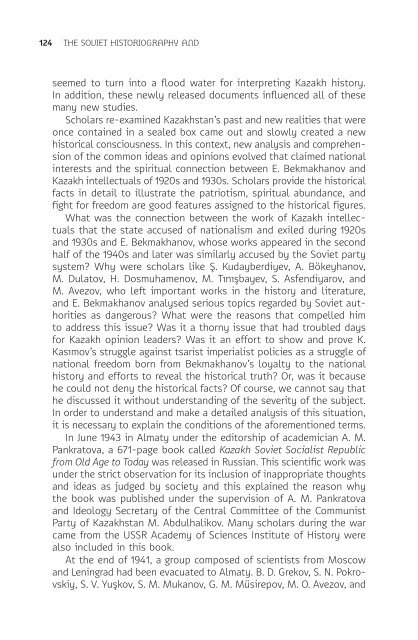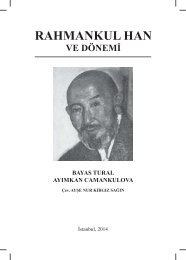THE SOVIET HISTORIOGRAPHY AND THE QUESTION OF KAZAKHSTAN’S HISTORY
SOVYET-TARIH-YAZICILIGI-ENG
SOVYET-TARIH-YAZICILIGI-ENG
Create successful ePaper yourself
Turn your PDF publications into a flip-book with our unique Google optimized e-Paper software.
124<br />
<strong>THE</strong> <strong>SOVIET</strong> <strong>HISTORIOGRAPHY</strong> <strong>AND</strong><br />
seemed to turn into a flood water for interpreting Kazakh history.<br />
In addition, these newly released documents influenced all of these<br />
many new studies.<br />
Scholars re-examined Kazakhstan’s past and new realities that were<br />
once contained in a sealed box came out and slowly created a new<br />
historical consciousness. In this context, new analysis and comprehension<br />
of the common ideas and opinions evolved that claimed national<br />
interests and the spiritual connection between E. Bekmakhanov and<br />
Kazakh intellectuals of 1920s and 1930s. Scholars provide the historical<br />
facts in detail to illustrate the patriotism, spiritual abundance, and<br />
fight for freedom are good features assigned to the historical figures.<br />
What was the connection between the work of Kazakh intellectuals<br />
that the state accused of nationalism and exiled during 1920s<br />
and 1930s and E. Bekmakhanov, whose works appeared in the second<br />
half of the 1940s and later was similarly accused by the Soviet party<br />
system? Why were scholars like Ş. Kudayberdiyev, A. Bökeyhanov,<br />
M. Dulatov, H. Dosmuhamenov, M. Tınışbayev, S. Asfendiyarov, and<br />
M. Avezov, who left important works in the history and literature,<br />
and E. Bekmakhanov analysed serious topics regarded by Soviet authorities<br />
as dangerous? What were the reasons that compelled him<br />
to address this issue? Was it a thorny issue that had troubled days<br />
for Kazakh opinion leaders? Was it an effort to show and prove K.<br />
Kasımov’s struggle against tsarist imperialist policies as a struggle of<br />
national freedom born from Bekmakhanov’s loyalty to the national<br />
history and efforts to reveal the historical truth? Or, was it because<br />
he could not deny the historical facts? Of course, we cannot say that<br />
he discussed it without understanding of the severity of the subject.<br />
In order to understand and make a detailed analysis of this situation,<br />
it is necessary to explain the conditions of the aforementioned terms.<br />
In June 1943 in Almaty under the editorship of academician A. M.<br />
Pankratova, a 671-page book called Kazakh Soviet Socialist Republic<br />
from Old Age to Today was released in Russian. This scientific work was<br />
under the strict observation for its inclusion of inappropriate thoughts<br />
and ideas as judged by society and this explained the reason why<br />
the book was published under the supervision of A. M. Pankratova<br />
and Ideology Secretary of the Central Committee of the Communist<br />
Party of Kazakhstan M. Abdulhalikov. Many scholars during the war<br />
came from the USSR Academy of Sciences Institute of History were<br />
also included in this book.<br />
At the end of 1941, a group composed of scientists from Moscow<br />
and Leningrad had been evacuated to Almaty. B. D. Grekov, S. N. Pokrovskiy,<br />
S. V. Yuşkov, S. M. Mukanov, G. M. Müsirepov, M. O. Avezov, and



